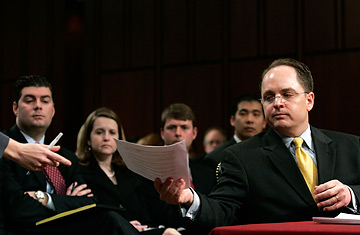
D. Kyle Sampson, former chief of staff to Attorney General Alberto Gonzales, is handed a paper to review during testimony at a Senate Judiciary Committee hearing on Capitol Hill March 29, 2007 in Washington DC.
The White House's hope had been that former Justice Department Chief of Staff D. Kyle Sampson would catch all the spears hurled by angry Senators in their investigation. And he caught plenty, admitting to all kinds of mistakes, like not keeping records, poorly preparing colleagues for Congressional testimony and most of all, once suggesting that U.S. Attorney Patrick Fitzgerald should be included on the list of prosecutors to be fired even as Fitzgerald was investigating Karl Rove and other White House officials in the Valerie Plame leak case. "It was a lapse and I regretted it as soon as I said it," Sampson said.
But in the process of all that spear-catching, Sampson managed to wound the two biggest targets of the Democratic Senators' interest as well: his former boss, Attorney General Alberto Gonzales, and Rove himself.
When the story of last year's firings first hit the national media, Gonzales initially said he didn't play a significant role in them. Weeks later he said he did attend a Nov. 27, 2006 meeting in which the firings were approved but that he had not been involved in the nuts-and-bolts selection of the candidates. Similarly, the Justice Department had told Congress that Rove had not been involved in the firings either, but then released documents showing that he had evinced some interest in the matter. In one fell swoop today, Sampson cast doubt on both those bottom-line defenses. He testified that former U.S. Attorney David Iglesias had been put on the chopping block list because Rove had told Gonzales about complaints registered against Iglesias, and Gonzales had relayed that message to Sampson.
Almost as bad as the drip, drip, drip of diminishing Administration denials is the overall suspicion surrounding the case. The central question raised by the firing of the U.S. attorneys by the Bush Administration is this: was Bush or Rove or anyone else at the top levels of the executive branch trying to subvert justice by firing prosecutors who were too light on Democrats or too tough on Republicans? Senators Chuck Schumer of New York and Dianne Feinstein of California say it appears the Administration was; the White House, Justice Department and Republican Senators adamantly say they weren't.
At the hearing, Feinstein reeled off a list of cases that some of the fired U.S. attorneys were pursuing — or had declined to pursue — that could have been seen as disadvantageous to the White House or other Republicans, implying that those cases might have been the cause of the firings. The list included: Carol Lam of San Diego, who was investigating the Randy "Duke" Cunningham bribery case and had issued subpoenas for the third-ranking CIA official the day before Sampson wrote in an e-mail that Justice had a "real problem" with her "right now"; Dan Bogden of Nevada, who had opened a probe relating to Nevada Republican Governor Jim Gibbons; John McKay, who had declined to intervene in a contested governor's election in Washington; Paul Charlton of Arizona, who had opened preliminary probes into Republican Congressmen Jim Kolbe and Rick Renzi; and Iglesias, who had been overseeing an investigation of state Democrats.
Sampson said he either didn't remember being aware of the cases, or remembered being aware of some through news accounts. In any case, he flatly denied that there was any "effort to interfere with or influence the investigation or prosecution of a particular case for political or partisan advantage."
But for Democrats, raising the suspicion of political foul play is an end in itself. They are locked in a larger battle over executive power, and are looking to force concessions from the White House in the form of the release of internal documents or the on-record testimony of close advisors like Rove, things the Administration's allies claim would set a dangerous precedent of sorts for future congressional investigations.
Which is why Sampson's testimony that he once suggested Fitzgerald be put on the list of prosecutors to be fired had Democrats so giddy. The suggestion didn't go anywhere, but the case Fitzgerald was pursuing was so political that the very fact that Fitzgerald's name was ever briefly considered inevitably ups the suspicion cast upon the entire set of firings. And, in the process, once again puts the target on the Democrats' favorite spear catcher, Karl Rove.
